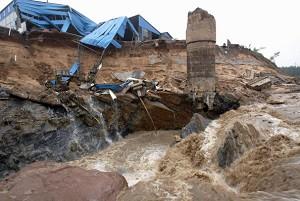Flood water filled two coal mines in Eastern China on August 17, and trapped 181 miners deep underground. According to Chinese officials’ rescue plan, 80 days will elapse before the water is pumped out from the mines. Meanwhile Chinese authorities are focusing on suppressing the protesting family members of the trapped miners, blocking their contact with outside world, and censoring relevant media reports.
The accident happened when the nearby Chaiwen River burst through an earthen levee in Xintai City. The officials estimated that the mine is filled with 12 million cubic meters of water.
Indignant with the lagging rescue plan, despairing families of the miners held demonstrations in protest. The demonstrators clashed with police, and are now under Chinese authorities’ close surveillance.
Local residents fear that the miners have little chance to survive, because the huge impact of the flood water may have killed the miners immediately when it poured into the mines. Besides, they said, considering the depth of the water under the mines, there may not be enough air left for the miners who escaped immediate drowning.
A local resident, Ms. Liu, told the reporter that angry family members of the miners have held protests in the past two days. The demonstrators clashed with police, and some broke into the mining company’s office building.
According to Ms. Liu, the families of the miners were irritated by the authorities’ indifference to the rescue, and turned their despair into anger. She also revealed that the local coal mines already resumed normal mining operations, with some only one day after the incident, though the authorities claimed all mining operations have been halted in the area.
Though slow in the rescuing, the authorities are efficient in hiding relevant information. According to a local source, the mining area is under hidden but close police surveillance. The office buildings of Huayuan Mining Co., owner of the flooded mines, are also filled with policemen.
A relative of one of the miners’ family said he tried in vain to contact the family by phone. He suspects the authorities blocked the phone lines of all miners’ families.
An August 20 article on Chinanews.com.cn, a government controlled website, says, “In order to ensure the stability of our society, the local Chinese Communist Party (CCP) committees and government have selected about 1000 people from government cadres and employees of nation-owned enterprises to help stabilize and comfort family members of the trapped miners. Each family has been assigned five such helpers.”
However, local residents pointed out that the so-called “helpers” were assigned only to spy on the families. According to Ms. Liu, a local resident, the authorities threatened to terminate all rescue efforts if the miners’ families keep protesting.
Besides monitoring local residents, the authorities also imposed strict censorship on media reports.
The same Chinanews.com article reported, “In order to keep the public informed of the accident, the local government organized about 130 reporters, including 16 reporters for overseas media, to visit the flooded mines, showed them the burst point on the dams, and allowed them to witness the rescue site where pumps are sucking out water from the mines.”
An editor from a Shandong newspaper revealed the truth of the media control. He said that all reporters were thoroughly checked and “educated” by the CCP before being allowed to visit the flooded areas. All articles resulting from the visits were censored by the CCP to insure consistency with the official version of the story. He said some reporters refused to participate because they were not interested in such show interviews.
The editor suspects that the said foreign reporters are all from Hong Kong. He said even the Hong Kong reporters allowed to go there are very “self-disciplined.” “In China everyone is afraid of dealing with sensitive information,” the editor explained. “No one wants to make political mistakes here.”



